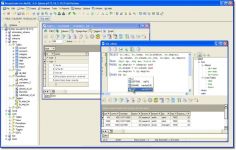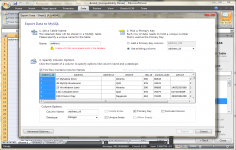 MySQL 5.1.32
MySQL 5.1.32
MySQL AB - (Open Source)
MySQL is a successful open source database used in most web applications, e-commerce and online transaction processing.
MySQL is one of the world's most famous and used open source database. The software can be used to manage web applications, e-commerce and online transaction processing since MySQL database incorporates support those transactions. It is also commonly associated with PHP when it comes to managing websites.
With standard JDBC , ODBC, and Net, the developer can choose the programming language. MySQL has the advantage of working with almost all the popular operating systems and communicate easily with programming languages ​​such as C, C + +, VB, C #, PHP, Python, Ruby, Java, Perl, Eiffel, etc.MySQL replication allows you to create profitable applications. In addition, it enables the development of typologies replication complex and massive chain.Its reliability and robustness, performance, ease of use makes MySQL have more success than anticipated.
- Title:
- MySQL 5.1.32
- File Size:
- 35.4 MB
- Requirements:
- Windows 9x / 2000 / XP / Vista / Windows7 / Windows8
- Language:
- en-us
- License:
- Open Source
- Date Added:
- 04 Mar 2009
- Publisher:
- MySQL AB
- Homepage:
- http://www.mysql.com
- MD5 Checksum:
- F018ED175D70EE7EDA52151A06F3F5E6
Functionality added or changed:
* Important Change: Replication: RESET MASTER and RESET SLAVE
now reset the values shown for Last_IO_Error, Last_IO_Errno,
Last_SQL_Error, and Last_SQL_Errno in the output of SHOW SLAVE
STATUS. (Bug#34654: http://bugs.mysql.com/34654)
* Incompatible Change: The fix for
Bug#33699: http://bugs.mysql.com/33699 introduced a change to
the UPDATE statement such that assigning NULL to a NOT NULL
column caused an error even when strict SQL mode was not
enabled. The original behavior before was that such
assignments caused an error only in strict SQL mode, and
otherwise set the column to the the implicit default value for
the column data type and generated a warning. (For information
about implicit default values, see Section 10.1.4, "Data Type
Default Values.")
The change caused compatibility problems for applications that
relied on the original behavior. It also caused replication
problems between servers that had the original behavior and
those that did not, for applications that assigned NULL to NOT
NULL columns in UPDATE statements without strict SQL mode
enabled. This change has been reverted so that UPDATE again
had the original behavior. Problems can still occur if you
replicate between servers that have the modified UPDATE
behavior and those that do not.
(Bug#39265: http://bugs.mysql.com/39265)
* The libedit library was upgraded to version 2.11.
(Bug#42433: http://bugs.mysql.com/42433)
Bugs fixed:
* Security Fix: Using an XPath expression employing a scalar
expression as a FilterExpr
(http://www.w3.org/TR/xpath#NT-FilterExpr) with ExtractValue()
or UpdateXML() caused the server to crash. Such expressions
now cause an error instead.
(Bug#42495: http://bugs.mysql.com/42495)
* Replication: START SLAVE UNTIL did not work correctly with
--replicate-same-server-id enabled; when started with this
option, the slave did not perform events recorded in the relay
log and that originated from a different master.
Log rotation events are automatically generated and written
when rotating the binary log or relay log. Such events for
relay logs are usually ignored by the slave SQL thread because
they have the same server ID as that of the slave. However,
when --replicate-same-server-id was enabled, the rotation
event for the relay log was treated as if it originated on the
master, because the log's name and position were incorrectly
updated. This caused the MASTER_POS_WAIT() function always to
return NULL and thus to fail.
(Bug#38734: http://bugs.mysql.com/38734,
Bug#38934: http://bugs.mysql.com/38934)
* Replication: TRUNCATE statements failed to replicate when
statement-based binary logging mode was not available. The
issue was observed when using InnoDB with the transaction
isolation level set to READ UNCOMMITTED (thus forcing InnoDB
not to allow statement-based logging). However, the same
behavior could be reproduced using any transactional storage
engine supporting only row-based logging, regardless of the
isolation level. This was due to two separate problems:
1. An error was printed by InnoDB for TRUNCATE when using
statement-based logging mode where the transaction
isolation level was set to READ COMMITTED or READ
UNCOMMITTED, because InnoDB permits statement-based
replication for DML statements. However, TRUNCATE is not
transactional; since it is the equivalent of DROP TABLE
followed by CREATE TABLE, it is actually DDL, and should
therefore be allowed to be replicated as a statement.
2. TRUNCATE was not logged in mixed mode because of the
error just described; however, this error was not
reported to the client.
As a result of this fix, TRUNCATE is now treated as DDL for
purposes of binary logging and replication; that is, it is
always logged as a statement and so no longer causes an error
when replicated using a transactional storage engine such as
InnoDB. (Bug#36763: http://bugs.mysql.com/36763)
See also Bug#42643: http://bugs.mysql.com/42643.
* Replication: mysqlbinlog replay of CREATE TEMPORARY TABLE ...
LIKE statements and of TRUNCATE statements used on temporary
tables failed with Error 1146 (Table ... doesn't exist).
(Bug#35583: http://bugs.mysql.com/35583)
* Replication: In statement mode, mysqlbinlog failed to issue a
SET @@autommit statement when the autocommit mode was changed.
(Bug#34541: http://bugs.mysql.com/34541)
* Replication: LOAD DATA INFILE statements did not replicate
correctly from a master running MySQL 4.1 to a slave running
MySQL 5.1 or later. (Bug#31240: http://bugs.mysql.com/31240)
* A '%' character in SQL statements could cause the server to
crash. (Bug#42634: http://bugs.mysql.com/42634)
* An optimization introduced for
Bug#37553: http://bugs.mysql.com/37553 required an explicit
cast to be added for some uses of TIMEDIFF() because automatic
casting could produce incorrect results. (It was necessary to
use TIME(TIMEDIFF(...)).)
(Bug#42525: http://bugs.mysql.com/42525)
* On the IBM i5 platform, the MySQL configuration process caused
the system version of pthread_setschedprio() to be used. This
function returns SIGILL on i5 because it is not supported,
causing the server to crash. Now the my_pthread_setprio()
function in the mysys library is used instead.
(Bug#42524: http://bugs.mysql.com/42524)
* The SSL certficates included with MySQL distributions were
regenerated because the previous ones had expired.
(Bug#42366: http://bugs.mysql.com/42366)
* User variables within triggers could cause a crash if the
mysql_change_user() C API function was invoked.
(Bug#42188: http://bugs.mysql.com/42188)
* Dependent subqueries such as the following caused a memory
leak proportional to the number of outer rows:
SELECT COUNT(*) FROM t1, t2 WHERE t2.b
IN (SELECT DISTINCT t2.b FROM t2 WHERE t2.b = t1.a);
(Bug#42037: http://bugs.mysql.com/42037)
* Some queries using NAME_CONST(.. COLLATE ...) led to a server
crash due to a failed type cast.
(Bug#42014: http://bugs.mysql.com/42014)
* On Mac OS X, some of the universal client libraries were not
actually universal and were missing code for one or more
architectures. (Bug#41940: http://bugs.mysql.com/41940)
* String reallocation could cause memory overruns.
(Bug#41868: http://bugs.mysql.com/41868)
* Setting innodb_locks_unsafe_for_binlog should be equivalent to
setting the transaction isolation level to READ COMMITTED.
However, if both of those things were done, non-matching
semi-consistently read rows were not unlocked when they should
have been. (Bug#41671: http://bugs.mysql.com/41671)
* REPAIR TABLE crashed for compressed MyISAM tables.
(Bug#41574: http://bugs.mysql.com/41574)
* For a TIMESTAMP NOT NULL DEFAULT ... column, storing NULL as
the return value from some functions caused a "cannot be NULL"
error. NULL returns now correctly cause the column default
value to be stored. (Bug#41370: http://bugs.mysql.com/41370)
* The server cannot execute INSERT DELAYED statements when
statement-based binary logging is enabled, but the error
message displayed only the table name, not the entire
statement. (Bug#41121: http://bugs.mysql.com/41121)
* FULLTEXT indexes did not work for Unicode columns that used a
custom UCA collation. (Bug#41084: http://bugs.mysql.com/41084)
* The Windows installer displayed incorrect product names in
some images. (Bug#40845: http://bugs.mysql.com/40845)
* SELECT statements could be blocked by INSERT DELAYED
statements that were waiting for a lock, even with
low_priority_updates enabled.
(Bug#40536: http://bugs.mysql.com/40536)
* The query cache stored only partial query results if a
statement failed while the results were being sent to the
client. This could cause other clients to hang when trying to
read the cached result. Now if a statement fails, the result
is not cached. (Bug#40264: http://bugs.mysql.com/40264)
* When a MEMORY table became full, the error generated was
returned to the client but was not written to the error log.
(Bug#39886: http://bugs.mysql.com/39886)
* The expression ROW(...) IN (SELECT ... FROM DUAL) always
returned TRUE. (Bug#39069: http://bugs.mysql.com/39069)
* The greedy optimizer could cause a server crash due to
improper handling of nested outer joins.
(Bug#38795: http://bugs.mysql.com/38795)
* Use of COUNT(DISTINCT) prevented NULL testing in the HAVING
clause. (Bug#38637: http://bugs.mysql.com/38637)
* Enabling the sync_frm system variable had no effect on the
handling of .frm files for views.
(Bug#38145: http://bugs.mysql.com/38145)
* Setting myisam_repair_threads greater than 1 caused a server
crash for table repair or alteration operations for MyISAM
tables with multiple FULLTEXT indexes.
(Bug#37756: http://bugs.mysql.com/37756)
* The mysql client sometimes improperly interpreted string
escape sequences in non-string contexts.
(Bug#36391: http://bugs.mysql.com/36391)
* The query cache stored packets containing the server status of
the time when the cached statement was run. This might lead to
an incorrect transaction status on the client side if a
statement was cached during a transaction and later served
outside a transaction context (or vice versa).
(Bug#36326: http://bugs.mysql.com/36326)
* If the system time was adjusted backward during query
execution, the apparent execution time could be negative. But
in some cases these queries would be written to the slow query
log, with the negative execution time written as a large
unsigned number. Now statements with apparent negative
execution time are not written to the slow query log.
(Bug#35396: http://bugs.mysql.com/35396)
* libmysqld was not built with all character sets.
(Bug#32831: http://bugs.mysql.com/32831)
* For mysqld_multi, using the --mysqld=mysqld_safe option caused
the --defaults-file and --defaults-extra-file options to
behave the same way. (Bug#32136: http://bugs.mysql.com/32136)
* For Solaris package installation using pkgadd, the postinstall
script failed, causing the system tables in the mysql database
not to be created. (Bug#31164: http://bugs.mysql.com/31164)
* If the default database was dropped, the value of
character_set_database was not reset to character_set_server
as it should have been.
(Bug#27208: http://bugs.mysql.com/27208)
Related software
2.1/5 from 178 users


